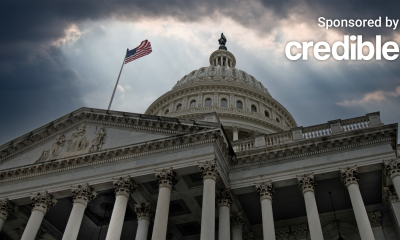Personal Finance
Inflation cools but interest rate and recession fears remain

The Consumer Price Index (CPI), a measure of inflation, increased by 6% year-over-year in February, according to the latest Bureau of Labor Statistics (BLS) report. The CPI rose by 0.4% on a monthly basis, largely driven by the growing costs of shelter, which accounted for more than 70% of the increase.
On an annual basis, the price of food at home increased by 10.2%. The costs of electricity services rose by 13.3%. And transportation services prices jumped by 14.6%.
However, the annualized CPI increase was the smallest 12-month increase since September 2021, indicating the Federal Reserve may ease its monetary policy.
Despite an inflation slowdown in recent months, many Americans have been struggling financially after a year that saw record-high inflation in 2022, a recent poll showed. In fact, half of Americans say they are worse off financially than a year ago according to a January Gallup poll. The only other time this sentiment was reflected was during the Great Recession of 2008 and 2009.
If you’re struggling with high-interest debt, you could consider paying it down with a personal loan at a lower rate. You can visit Credible to compare options from different lenders at once, without affecting your credit score.
CREDIT CARD DEBT INCREASED TO RECORD $931 BILLION: HERE’S HOW TO PAY DEBT QUICKLY
SVB collapse raises questions about interest rate hikes
To lower inflation, the Federal Reserve has raised interest rates eight times over the last year. But Friday’s closure of the commercial bank Silicon Valley Bank (SVB) and the uncertainty that’s spreading across the banking sector may push the Fed to slow down, some economists projected.
In fact, Goldman Sachs no longer expects the Fed to raise interest rates at its next two-day meeting on March 21 and 22. Treasury Secretary Janet Yellen noted rising interest rates were at the core of SVB’s shutdown.
“Markets were expecting a 50-basis point increase in Federal Funds rate last week after a strong employment report and inflation still higher than the Federal Reserve’s target,” Dawit Kebede, a senior economist at the Credit Union National Association (CUNA), said in a statement. “This view changed over the weekend after the collapse of Silicon Valley Bank and Signature Bank.”
“The fast and large increase in rates contributed to the collapse of these banks,” Kebede added. “This failure of financial institutions will cause the Federal Reserve to be more cautious about unforeseen events that could cause instability. Moreover, the rates in place are already showing the intended consequences of slowing down investment and consumption.”
However, Goldman Sachs believes the Fed could still increase rates by 25 basis points in May, June, and July. Prior to the collapse of SVB and the publication of a strong jobs report, Fed Chair Jerome Powell told a Senate panel the Fed could increase interest rates by a larger range in response to a strong economy and high inflation.
“The Federal Reserve will most likely prioritize financial stability as the more immediate concern relative to inflation, balancing these issues by enacting a quarter-point hike while extending the timeline of its overall tightening cycle,” Noah Yosif, an economist at the National Association of Federally-Insured Credit Unions (NAFCU), said in a statement. “This shock does raise the risk of a recession; however, such an event would be more likely to materialize if the Federal Reserve were forced to assume an elongated pause in the current tightening cycle against inflation, rather than from an independent crisis driven by increased market pessimism and turbulence.”
If you’re concerned about rising interest rates, you could benefit from refinancing your mortgage for a lower rate. You can visit Credible to speak with a refinancing expert and see if this option is right for you.
INFLATION, RECESSION FEARS DAMPEN FINANCIAL HEALTH OUTLOOK FOR MANY: SURVEY
Recession may still be on the horizon
The Fed’s decision to keep raising interest rates could slow down inflation and bring it back to its target range of 2%. But the move could also push the country into a recession.
While there’s no official definition of a recession, many economists define it as two consecutive quarters of economic decline. That’s something the country went through in 2022. However, The National Bureau of Economic Research (NBER) never declared a recession.
Still, uncertainty remains. Bank of America, Citigroup, the Mortgage Bankers Association and the First National Bank of Omaha (FNBO) have predicted at least a mild recession in 2023.
“We won’t be at the Fed’s inflation target until 2024,” Mike Fratantoni, the MBA’s chief economist and senior vice president, said at the 2022 MBA Annual conference.
“We are really highly confident we are going to be in a recession next year,” Fratantoni added.
According to FNBO’s 2023 Market Outlook, “Economic downturn is likely in the U.S. as most economic indicators currently point to a deceleration at the minimum and/or probable contraction. Aggressive Fed monetary tightening and higher interest rates may negatively impact economic growth.”
If you’re struggling in today’s economy, you could consider paying off high-interest debt with a personal loan. You can visit Credible to get your personalized rate in minutes.
CONSUMER CREDIT INCREASED BY NEARLY $30 BILLION, EXPERTS EXPECT RECORD DELINQUENCIES IN 2023
Have a finance-related question, but don’t know who to ask? Email The Credible Money Expert at moneyexpert@credible.com and your question might be answered by Credible in our Money Expert column.
Read the full article here

-

 Side Hustles6 days ago
Side Hustles6 days agoWhy the Best CEOs Think Like Anthropologists
-

 Side Hustles4 days ago
Side Hustles4 days agoThis User-Friendly H&R Block Software Package is Only $40, While Supplies Last
-

 Investing4 days ago
Investing4 days agoTikTok faces US ban deadline as users brace for fallout By Reuters
-

 Passive Income3 days ago
Passive Income3 days agoTrain for a New Tech Career in 2025 With This $25 Course Bundle
-

 Personal Finance5 days ago
Personal Finance5 days agoDecember inflation clouds Fed's outlook on interest rate cuts
-

 Personal Finance6 days ago
Personal Finance6 days agoCalifornia's homeowners insurance industry faces rough road ahead as wildfires continue
-

 Investing6 days ago
Investing6 days agoWhy Not Owning Bitcoin is Making You Poor
-

 Make Money6 days ago
Make Money6 days agoDon’t Settle: 5 Game-Changing Moves to Maximize Your Financial Advisor’s Impact


















